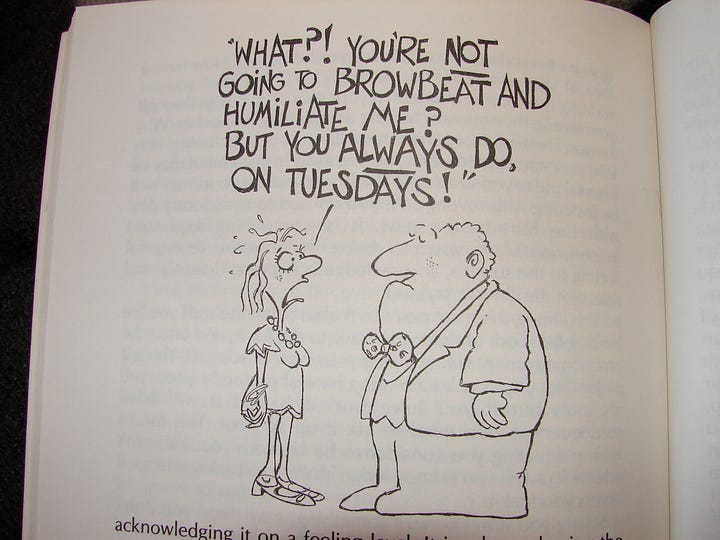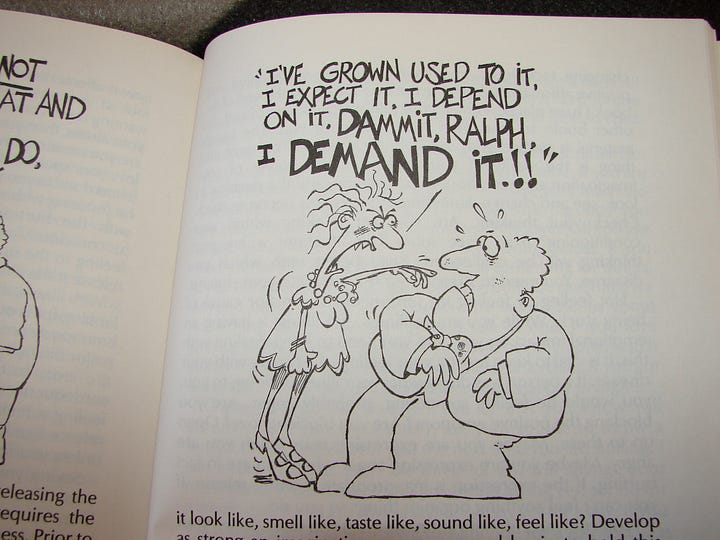

She was a sick puppy too.
She had a connective tissue disorder, angina, hypertension, asthma, mild diabetes, and schizophrenia. Her bedside table drawer contained a mountain of pills she ploughed through every day.
Some people have all the luck.
And yet, with all of her suffering (there’s more to come), she was a smiler. Her smile transformed her. She managed to smile even though her antipsychotic medication made it difficult. Most of the time, she wore a deadpan look.
She was married to an alcoholic seaman. Alcohol consumed a large part of his income. She had two kids in their twenties — not sure who the father was. The boy was in jail for robbery with violence. Mary hadn’t heard from her daughter in a couple of years.
She and her husband lived in a house unpainted for many years. It sat at a bit of an angle. The garden was full of car parts and bent car bodies. Kikuyu grass grew into and partially covered everything. A hinge on the gate was missing. There was little left of the fence. Most of the furniture was made from wooden boxes and bits from the dump.
“Doctor, she’s having another attack. Can you come and see her?”
It was two in the morning — her husband on the phone.
She was tight as a drum, struggling to breathe. Another asthma attack. As I got to work — IV, drugs, oxygen — I noticed another woman in the house. I had an uncomfortable feeling. Who was she? What was she doing here at 2am?
“I’ll come and see you first thing in the morning, Mary — before surgery — just to make sure you’re okay.”
She thanked me. She was breathing easier now.
When I arrived the next morning, she was alone.
My curiosity had been aroused — none of my business, I know, but...
“Who was that woman, Mary?” I asked.
Tears began to flow. She remained silent, not able to look at me.
“Mary?”
“That’s a woman he’s been inviting home recently.”
“I don’t understand, Mary.” I looked at her with concern. I kind of knew this was not going to be an elevating story.
“He comes home tight as, and brings her with him. He throws my nightie and things out of our bedroom and tells me to sleep in the lounge.”
She paused. Silence. Sobbing.
“They go to bed together. I hear everything they get up to.”
“Jesus, Mary, I’m sorry. How do you put up with it?” I was astounded by his blatant cruelty. I was angry.
“I don’t have any choice really. He has all the money. The house is in his name. I have nowhere to go and I am not well. He’s been doing this kind of thing — amongst other things — for years after he comes back from the pub. When he’s sober, he is nice to me.”
I made her a cup of coffee. She took it, lit a cigarette, and stared silently at the floor.
Her husband came back and sat down.
“Get me a cup of coffee, Mum, please — and my breakfast.”
Oh my God. I was angry. My blood was boiling. I felt like smashing that childish smirk off his face.
“Do you mind leaving us for a moment?” I asked, as politely as I could, through the tightness in my throat.
He got up and shambled out into the garden. He took the smell of stale alcohol with him. His blood alcohol was probably still up in the sky.
“Mary, we can arrange for you to go somewhere. There are places — run by women — where you can stay. They can look after you. Help you for a while.”
She responded as if she had not heard me.
“Do you know, Doc, when he gets up in the morning, he takes her home — and on the way out, demands I clean up…”
I was speechless.
I drove to my surgery with a sense of despair.
Her story was gross, to say the least. But she was not the only patient of mine living in similar madness. Maybe not as colourful. Maybe not as unbelievable.
She, like most of them, was trapped — unable to move and unable to accept help. Unlike others, she hardly ever talked about it. She was long-suffering, and somehow, in all this pain, she had a generosity of spirit.
I was always willing to help Mary, whatever time of day or night she called.
For years, people like her live being battered with pain.
My prescription pad was useless.
What use were all those pills to her?
Commentary
Believe it or not, this story is authentic — bar some painting of the picture. Unusual, maybe. But maybe not that unusual. The theme certainly isn’t.
Mary’s husband used to bring me things from Rarotonga and other places his job took him. He was sick too — angina, hypertension, emphysema. He had a pickled liver. He probably had some early dementia.
In his own funny way, he loved her. He’d talk with me about how he worried about her.
Incongruent, certainly — but I could sense his caring, and his own despair.
What a mess.
Two sad, unhappy people with a drawer full of pills and puffers to keep them from dying.
One could say they’d died years ago.
Maybe they were a romantic couple once, walking the beaches, hand in hand.
How cruel and self-destructive they had become.
The cruelty and destruction of these two is so glaring, so unhidden. Many of us would look with disdain at their behaviour and feel condemnation.
And yet the more sophisticated of us do similar things — less gross, less easy to see. Hidden. Not so easy to describe and point to.
No outright abuse — just judgements, put-downs, lies, denials, blaming, guilting, false claims etc.
A battle for domination under the guise of social norms.
A guy came to see me today with his wife. I suggested some reading material. He looked to her. She got out a pencil and paper and took the list down.
No doubt she’d do the shopping too. Maybe even wipe his arse.
He was treating an intimate as a paid clerk.
Common and normal behaviour? Sure.
“What’s wrong with that?” I can hear some of you thinking.
It’s damaging behaviour. No please or thank you. Just an expectation, as of right.
“I have this right. She is my wife.”
“I have to do this. He is my husband.”
“I can treat you as a slave.”
“It is my duty to be a slave.”
Both are playing the game. It takes two to tango.
We harm ourselves and others when we treat each other — and ourselves — just as roles.
There is no room for realness, intimacy, oneness.
Just two actors playing roles, not knowing they’re in a play.
A gambler — a prominent member of society — and his wife were being counselled. I sat in on the session. Their finances had been arranged so he had no access to his salary or any bank accounts. She gave him a few bucks a week for smokes or whatever.
In recent weeks, he had gambled ten grand and lost it.
How did he get the money?
A simple question that took about an hour to clarify.
She’d opened a new account and given him access to it.
On being asked why, there followed an outpouring of verbiage, explanations, and rationalisations — none of which made sense.
The bottom line? He had no access to any money bar his week’s allowance.
She had given him access.
Why?
What was her motivation?
What game of destruction were these two up to?
Did she need a bad boy to blame and control?
Did he need a stern mother to scold him?
Even when the story was exposed, no one took responsibility.
I could see the end result: a newspaper article about this man going to jail for embezzlement. A heart-rending story about how he destroyed his family and ruined his wife’s life.
Most readers would be tut-tutting about this destructive man, and feeling sorry for his self-pitying partner.
Two partners in crime — one jailed and one sympathised with?
Like it or not, she set the scene for his last gambling spree.
She needed him to gamble.
How we hurt and harm ourselves and each other!
Who, me? I hear you ask.
No, not you of course.
You are probably the rare exception — already sitting at the right hand of God.
We have all been taught the skills of manipulation — whether we play wimp or bully, it’s all part of the same game of ping-pong.
While we play these destructive games, we get to play the innocent one. And secretly rub our hands in glee when others agree with us:
“My spouse is a louse.”
In some weird way, we feel power and control by being weak — by twisting other people’s heartstrings.
If you’re feeling guilty…
Or you’re inducing this in your spouse…
If things aren’t going well in your relationships…
And if I were a gambling man, I’d bet my house that you are playing a game — knowingly or not.
“If I do what I want, s/he will hold the tension. If I do what s/he wants, I’ll have it.”
This can be the basis of for a game.
Who will hold the tension?
Instead of giving love, we play tennis with a ball of tension.
Forty-fifteen.
Game.
I win, you lose.



